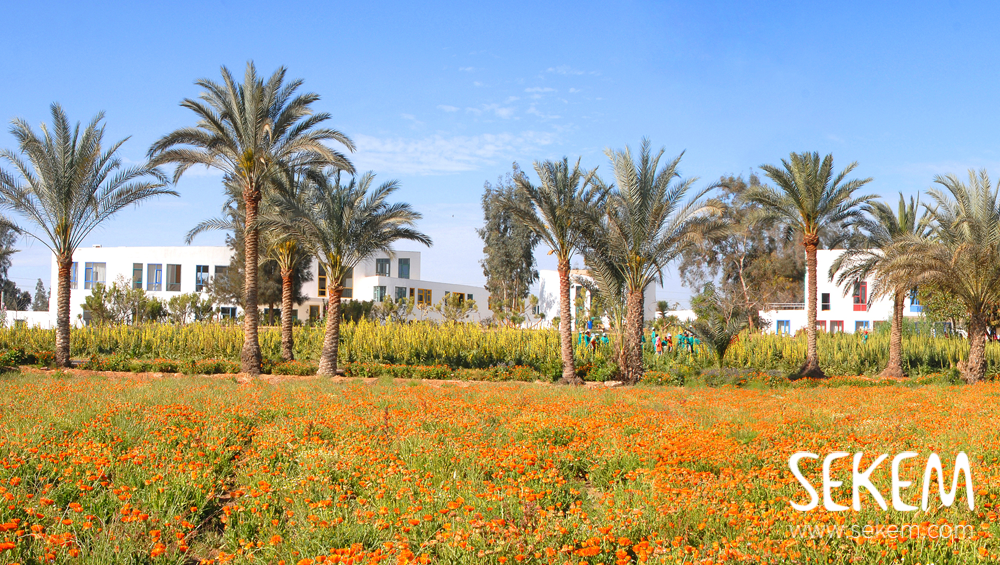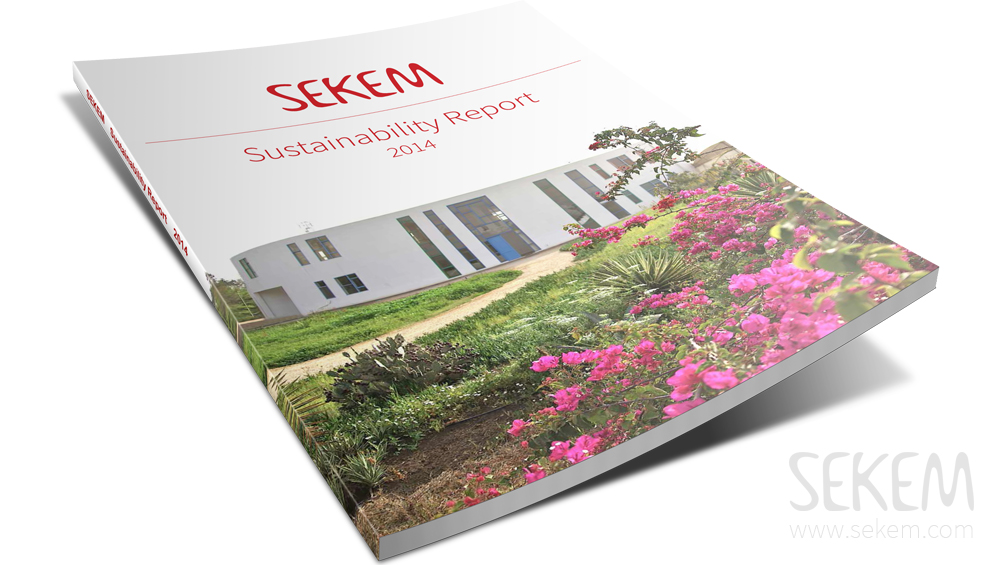For the eighth time, SEKEM and its companies publish an annual report on sustainable development. The comprehensive documents recounts the steps taken by the initiative towards greater sustainability in four dimensions.
“We are proud and grateful”, Helmy Abouleish writes in the preface to this year‘s sustainability report by the SEKEM Initiative. „The last four years have not been easy for us and yet we can now say: Yes, we did it!“, the Managing Director of SEKEMs companies further adds. The current report on sustainable development published by the Egyptian initiative is also a sign of gratitude to partners and friends who have supported SEKEM to successfully complete the year of 2014 in spite of great economic and social challenges.
The report was presented to the general public at an event on 12 April 2015 which was attended also by some of these companions, for instance shareholders of GLS Bank and OikoCredit, two financing partners who have invested heavily in SEKEM. As long-term SEKEM partners, they have for many years financially committed themselves to working for and with the initiative in Egypt to advance its organic business.
An Integrated Approach to Development
For the eighth time, the SEKEM initiative and their companies publish their annual report on achievements in four dimensions of sustainable development: economic, social, cultural life and ecology. The summary document reflects the desire of SEKEM to advocate for an integrative approach to the care for human and natural development. Instead of concentrating on “business as usual” and to later fix the problems cause by such behaviour, SEKEM encourages ethical business behaviour that integrates with environmental and social initiatives in the first place. Its „Flower of Sustainability“,
„We are grateful to have come through the revolution years relatively unscathed.”
The management approach that guides the SEKEM companies’ performance, has been the basis of the work of these enterprises for years. It aims at a holistic and equitable interaction of man and nature in all regions of society.
Waste and Recycling
Four years after the revolution, the situation in Egypt has somewhat calmed down and the country is slowly regaining economic stability. In this gradually improving business climate, the SEKEM companies managed to increase their sales by 27 %. This development was necessarily accompanied by an increased production of waste, which was, however, limited to a rise of only 10 % – a very positive achievement in the light of strongly improving business. Thus, the productivity ratio of the use of natural resources by the SEKEM firms is continuously improving.
SEKEM is already able to recycle all organic waste it produces and in addition is recycling about one-third of its non-organic waste. Just under half of all packaging material used is also already recycled. The rate of waste recovered is steadily increasing. For 70% of all products, its companies now create a certified CO2 footprint. The emission of climate-damaging CO2 could be reduced from 21 to 13 kilograms per 1,000 EGP in sales.
SEKEM could also significantly reduce the still unavoidable employment of fossil fuels on its farms.

Reclaiming More and More Desert Grounds
In agriculture, SEKEM could continue with its efforts to green the desert over the past year. Today, it cultivates a total of 1,628 feddans (around 684 ha) of ground that was reclaimed in this way. This represents roughly twice the size of New York‘s Central Park. The majority of this ground is farmed bio-dynamically.
Agriculture on these soils always has to cope with the challenges of irrigation. The preciousness of water is on the minds of everyone involved in agriculture in Egypt and SEKEM strives every day to use as little water as possible and preserve the most valuable resource of the desert. With the help of custom-built irrigation systems, SEKEM could reduce agricultural water consumption by a further 25 % in 2014.
SEKEM also places great importance on the preservation and protection of seeds. Since 2009 the initiative has been maintaining its own seed bank that presently boasts 234 different varieties – an increase of 22% compared to 2013.
Social Initiatives Extend Their Reach
SEKEMs social institutions could also expand their activities in 2014. The medical centre, for instance, has treated a total of over 41,000 patients that year.
Aside from receiving treatment for existing illnesses, residents from the surroundings of SEKEM have also benefited from 194 micro loans to help them start their own small businesses. That‘s almost twice as many as during the year before.
In 2014, the SEKEM companies have also continued their engagement for equal opportunities for women and men. In this context, the demand for early child care has significantly increased. More and more mothers are choosing gainful employment when they know their children in good hands. In 2014 twice as many infants as last year were cared for in SEKEM facilities.
Opened in 2012, the Heliopolis University is also developing rapidly. The number of students increased to 554. 20 % of them receive a scholarship.
Generally speaking, the development of SEKEM is giving cause for celebration: „We are grateful that we have mastered the revolutionary years, and are pleased that we can continue promoting sustainability“ says Helmy Abouleish. „We confidently look into the future!”
Read the full report here!
Christine Arlt

